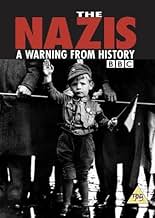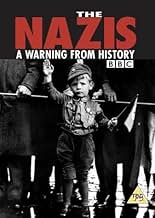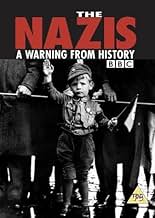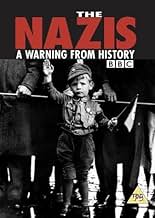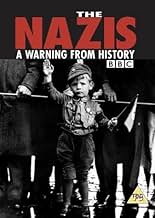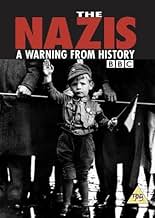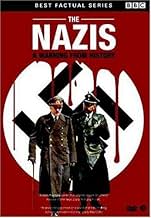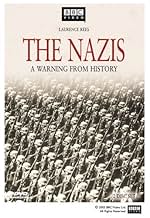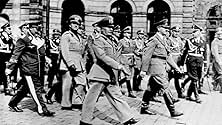The Nazis: A Warning from History
- TV Mini Series
- 1997
- 49m
IMDb RATING
8.7/10
1.8K
YOUR RATING
An examination of how a cultured people could have allowed Adolf Hitler's rise to power.An examination of how a cultured people could have allowed Adolf Hitler's rise to power.An examination of how a cultured people could have allowed Adolf Hitler's rise to power.
- Won 2 BAFTA Awards
- 4 wins & 1 nomination total
Browse episodes
Featured reviews
Sometimes in the late hours or at strange moments one is left to wonder about the nature of life and death, the future. Watching the Nazis: A Warning from History gives one just such thoughts. What was it like to be a young German in 1934 watching this great revolution unfolding? A thousand changes imperceptible and perceptible, talk of destiny and triumph, erasing the past for a new future. It makes one wonder about the next step to take, and where it may lead one years down the line.
In this documentary we experience the various chapters in the Nazis' rise, moving forward with the Germans as each change, each new step by the Reich brings about a new world of possibilities, but still with enough retrospect to know where it's all heading. It's frightening, one feels like a blind man walking but inevitably we know the dark place we're going. The Nazis were bad, born out of chaos aided by fate, but from the day to day life of the poor German it was an evil that might've seemed good at first, and certainly an evil much more abstract than the daily struggle to survive, in the wake of WW1 and Versailles. With each chapter we watch the Nazis' rise as one of them, we're in the present and when events finally cascade we feel just as helpless as that nation held sway under evil forces along with its countless victims.
The Nazis: A Warning from History is something to see because it detaches us from the our time and let's us witness first hand how our own weakness, desperation, and bitterness can lead us to a place much worse than the one we left. The cold, evil, and unrepentant accounts of those who took part in the killings contrasted with those who knew but felt powerless, along with those who felt clever enough to ride the wave only to find themselves crushed beneath, paint a dark picture. An ugly world, shrouded in darkness where the future is an illusion disclosed by carnival frauds, and when curtain falls the people are left with the consequence of their ignorance and heartlessness.
From the infighting of the Weimar Republic, to the rise of the National Socialist party, to re-armament, colonization, war, and final defeat we are left to wonder how it all happened. Some still cling to their blame of the Germans, but with the silent knowledge that we're no longer talking about Germans anymore, we're watching humanity. As it happened before so has it happened again, and could easily yet still.
In this documentary we experience the various chapters in the Nazis' rise, moving forward with the Germans as each change, each new step by the Reich brings about a new world of possibilities, but still with enough retrospect to know where it's all heading. It's frightening, one feels like a blind man walking but inevitably we know the dark place we're going. The Nazis were bad, born out of chaos aided by fate, but from the day to day life of the poor German it was an evil that might've seemed good at first, and certainly an evil much more abstract than the daily struggle to survive, in the wake of WW1 and Versailles. With each chapter we watch the Nazis' rise as one of them, we're in the present and when events finally cascade we feel just as helpless as that nation held sway under evil forces along with its countless victims.
The Nazis: A Warning from History is something to see because it detaches us from the our time and let's us witness first hand how our own weakness, desperation, and bitterness can lead us to a place much worse than the one we left. The cold, evil, and unrepentant accounts of those who took part in the killings contrasted with those who knew but felt powerless, along with those who felt clever enough to ride the wave only to find themselves crushed beneath, paint a dark picture. An ugly world, shrouded in darkness where the future is an illusion disclosed by carnival frauds, and when curtain falls the people are left with the consequence of their ignorance and heartlessness.
From the infighting of the Weimar Republic, to the rise of the National Socialist party, to re-armament, colonization, war, and final defeat we are left to wonder how it all happened. Some still cling to their blame of the Germans, but with the silent knowledge that we're no longer talking about Germans anymore, we're watching humanity. As it happened before so has it happened again, and could easily yet still.
10Rich-315
An evocative series which rather than investigating the Second World War as a whole, looks at how it could have happened. How did anti-semitism permeate throughout Germany society? How did people feel about having to murder civilians in cold blood? Anyone who believes in the ultimate goodness of humanity will be left with the shivers after watching interviews with ex-Wermacht and SS soldiers who took part in massacres. The sheer indifference of one individual who clearly has never even heard of the concept of guilt never mind considered it is horrifically compelling. This is a man who could appear as a harmless grandfather, still harbours no regrets about his role and claims that his very short prison terms alleviates him of any responsibility for the taking of innocent lives. This series is fundamentally important history as it illuminates what humanity is capable of when all normal controls are removed and men are invited to behave in a lawless manner. Furthermore, with recent history in Rwanda and the Balkans leaving many people shaking their heads at what could motivate such savagery, this series offers a potential cross-referenced explanation.
Watch it; you'll be compelled to try and understand why and how.
Watch it; you'll be compelled to try and understand why and how.
It seems a shame that it has been criticised, I think this series, especially the 5th episode deals with the subject in a very interesting manner.
Road to Treblinka (title of 5/6) is itself a marker on what this series is all about; so easily it could have been road to Auschwitz-Berkenau or Bergen-Belsen, where there would have been plenty (respectively) of survivors to recount tales and make us cry, but this wasn't about understanding what happened (Premo Levi said that this would be indecent itself, to understand it is almost like sympathising) but this series, as Rees discusses in The Holocaust and the Moving Image (Haggith and Newman) is about discussing the unadulterated scale of murder. Treblinka was a factory, a death factory which filled its quota and was destroyed and hidden from history.
This series asks the difficult questions to the right people. How could you stand there and shoot those children? to a Lithuanian Nazi sympathiser, Why did you think Reinhard Heydrich was a nice man? to his friend.
This series is not about understanding. It is about looking at what happened and remembering it. Forgetting it is inviting it to happen again.
Watch this and remember.
Road to Treblinka (title of 5/6) is itself a marker on what this series is all about; so easily it could have been road to Auschwitz-Berkenau or Bergen-Belsen, where there would have been plenty (respectively) of survivors to recount tales and make us cry, but this wasn't about understanding what happened (Premo Levi said that this would be indecent itself, to understand it is almost like sympathising) but this series, as Rees discusses in The Holocaust and the Moving Image (Haggith and Newman) is about discussing the unadulterated scale of murder. Treblinka was a factory, a death factory which filled its quota and was destroyed and hidden from history.
This series asks the difficult questions to the right people. How could you stand there and shoot those children? to a Lithuanian Nazi sympathiser, Why did you think Reinhard Heydrich was a nice man? to his friend.
This series is not about understanding. It is about looking at what happened and remembering it. Forgetting it is inviting it to happen again.
Watch this and remember.
Six 45-minute episodes are arranged chronologically, from the NSDAP rise in the context of the social and political turmoil which followed the first world war to Hitler's suicide in April 1945, and arranged thematically, dealing with the origins of the party, the road to the Chancellery, Anschluss, resettlement in the East, the death camps, and finally the Reich's collapse.
The first episode mentions the workers revolution that briefly took control of München, and shows how the number of Jews among the Communist leadership supported widespread theories of a Jewish-Communist alliance. Street-fighting between Communists and reactionaries is chronicled, explicating the German populace's understandable desire for law and order.
Local operation of the Gestapo, the surprisingly low count of actual employees and the extent to which surveillance by neighbors led to non-conformant citizens' denunciation and imprisonment is illustrated through a brief look at a case in Nürnberg. The informant who sent her innocent neighbor to die in a camp is interviewed.
The Wild East chapter illustrates the great variance in regional Nazi commanders' approach to Germanization of Poland and how Hitler's management style facilitated bureaucratic fiefdoms.
Too often documentaries demonize the Nazis and assume individuals somehow sprang fully formed from the gates of hell. In contrast, each of the well-crafted installments of The Nazis: A Warning from History offers new insight into the development and functioning of the Nazi state and enables us to intelligently consider the lives of its supporters. In calling for a more sophisticated understanding of totalitarianism the warning is very much that of Resnais' Night and Fog.
The first episode mentions the workers revolution that briefly took control of München, and shows how the number of Jews among the Communist leadership supported widespread theories of a Jewish-Communist alliance. Street-fighting between Communists and reactionaries is chronicled, explicating the German populace's understandable desire for law and order.
Local operation of the Gestapo, the surprisingly low count of actual employees and the extent to which surveillance by neighbors led to non-conformant citizens' denunciation and imprisonment is illustrated through a brief look at a case in Nürnberg. The informant who sent her innocent neighbor to die in a camp is interviewed.
The Wild East chapter illustrates the great variance in regional Nazi commanders' approach to Germanization of Poland and how Hitler's management style facilitated bureaucratic fiefdoms.
Too often documentaries demonize the Nazis and assume individuals somehow sprang fully formed from the gates of hell. In contrast, each of the well-crafted installments of The Nazis: A Warning from History offers new insight into the development and functioning of the Nazi state and enables us to intelligently consider the lives of its supporters. In calling for a more sophisticated understanding of totalitarianism the warning is very much that of Resnais' Night and Fog.
Perhaps the most solid and interesting documentary I have ever seen. This exploration of Nazi history attains a scholarly approach that is neither inflammatory nor preachy, helping viewers to see how the Nazis came to power and how the atrocities came to be committed. It was not all about one big, bad wolf who scared everyone into blind obedience.
Unlike Michael Moore's humor, flash-and-propaganda documentaries, this one not only interviews the victims as well as perpetrators without comment but also presents photographs and historical, archival documents and footage to illustrate the cool narration of facts. Amazingly, it manages to avoid commentary while presenting and interviewing those involved, including Nazis who were remorseful as well as those who were not, without ridicule. It is quite astonishing to hear how cold-blooded people were, right from their own mouths. Many knew what they were doing and some even made their own decisions about their cruelty and testified right on camera. Several still have no remorse about it.
As in quality scholarly historical scholarship, everyone stands on their own, leaving the audience members with the complete picture, facts, angles, voices, footage and photos to think for themselves. Remarkable collection and tight, professional filmmaking (choices, interviews and editing) - unbelievably thorough in research and excellent in presentation. An exemplary must-see for any history buff or documentary maker or anyone wondering about the Nazis. 10 out of 10
Unlike Michael Moore's humor, flash-and-propaganda documentaries, this one not only interviews the victims as well as perpetrators without comment but also presents photographs and historical, archival documents and footage to illustrate the cool narration of facts. Amazingly, it manages to avoid commentary while presenting and interviewing those involved, including Nazis who were remorseful as well as those who were not, without ridicule. It is quite astonishing to hear how cold-blooded people were, right from their own mouths. Many knew what they were doing and some even made their own decisions about their cruelty and testified right on camera. Several still have no remorse about it.
As in quality scholarly historical scholarship, everyone stands on their own, leaving the audience members with the complete picture, facts, angles, voices, footage and photos to think for themselves. Remarkable collection and tight, professional filmmaking (choices, interviews and editing) - unbelievably thorough in research and excellent in presentation. An exemplary must-see for any history buff or documentary maker or anyone wondering about the Nazis. 10 out of 10
Did you know
- GoofsDuring the "Chaos and Consent" segment, the tune "Happy Days Are Here Again" which is associated with drinking (it was FDR's Prohibition-repeal campaign song) is played while showing Hitler raising a glass stein within a crowd of stein-holding pub visitors. The visuals, music, and certainly the narration imply that Hitler might have been a drinker, yet (as cited in non-fiction histories by William Shirer and by Albert Speer) he was a well-known alcohol-abstainer.
- ConnectionsFeatured in The 50 Greatest Documentaries (2005)
- How many seasons does The Nazis: A Warning from History have?Powered by Alexa
Details
- Runtime
- 49m
- Color
- Aspect ratio
- 1.33 : 1
Contribute to this page
Suggest an edit or add missing content

